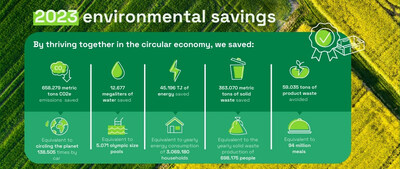- IFCO Sustainability Certificates recognize the commitment of growers, producers and retailers to make the global fresh grocery supply chain sustainable.
- IFCO Sustainability Certificates acknowledge each customer’s specific environmental savings achieved together with IFCO in 2023.
- Third-party, peer-reviewed Life Cycle Assessment (LCA) studies are the basis for scientifically calculating the environmental impact and benefits.
- The LCA studies show that by using IFCO RPCs instead of single-use packaging customers save up to 60% CO2e, 64% energy and 80% water, as well as reduce solid waste by 86%.
MUNICH, Germany, Feb. 13, 2024 /PRNewswire/ — Following another record year in environmental savings, IFCO, the world’s leading provider of Reusable Packaging Containers (RPCs) for fresh products, has awarded customers with the IFCO Sustainability Certificate for the seventh consecutive year. The individual customer certificates recognize the commitment of growers, producers and retailers to improve the environmental performance of their supply chains. Importantly, each certificate highlights the specific environmental savings achieved together with IFCO in terms of carbon emissions, energy use and water consumption, as well as in solid waste and food waste.

Record environmental savings achieved in 2023
In total, by using the IFCO SmartCycle circular business model, customers have generated the following environmental savings in 2023.
- 658,279 metric tons CO2e emissions — equivalent to circling the planet 138,505 times by car
- 363,070 metric tons of solid waste — equivalent to the yearly solid waste production of 698,175 people
- 12,677 megaliters of water — equivalent to 5,071 Olympic size pools
- 45,196 terajoules of energy — equivalent to the yearly energy consumption of 3,069,180 households
- 59,035 tones of product waste — equivalent to 94 million meals
The role of Life Cycle Assessments and the IFCO Sustainability Certificate
Backed by the results of third-party, peer-reviewed Life Cycle Assessment studies, IFCO reliably calculates the environmental benefits of using IFCO RPCs and awards trustworthy Sustainability Certificates to its customers each year. The LCA studies,1 which were carried out by LCA experts Franklin Associates in the US and the Fraunhofer Institute in the EU, scientifically quantify the environmental performance of IFCO RPCs compared to single-use packaging. The studies were performed in accordance with ISO 14040/44, the leading international standard for life cycle assessment (LCA) studies, the life cycle impact assessment (LCIA) phase and life cycle inventory (LCI) studies. By analyzing carbon emissions, energy use, water consumption, solid waste and food waste, these studies provide comprehensive data on the cradle-to-grave environmental savings achieved through switching from single-use packaging to IFCO RPCs.
The LCA studies show that, compared to using single-use packaging, customers generate up to 60% less CO2e, use 64% less energy, consume 80% less water, and reduce solid waste by 86% and A separate study by the Fraunhofer Institute and University of Bonn found that the IFCO RPCs also reduce food waste by 96%.2
Essentially, the environmental benefits are achieved as IFCO RPCs are reused up to 120 times, repaired when damaged and, when no longer repairable, granulated to be closed-loop recycled into new IFCO RPCs at the end of their long service life. This unique circular model has recently received the prestigious Cradle to Cradle Certified® Silver recertification for the European Lift Lock RPCs. In addition, the unique IFCO SmartCycle pooling system is professionally managed through high-tech, resource-efficient Service Centers, which supports producers, suppliers, distributors and retailers in achieving their ambitious sustainability goals and reducing the overall environmental footprint of their supply chains.
Going beyond the circular IFCO SmartCycle
While the LCA studies confirm that the IFCO circular business model is inherently sustainable, the company is committed to achieving even more. Guided by the IFCO ESG (Environmental, Social, Governance) 2025 strategy, Thriving in the Circular Economy, IFCO has set ambitious goals to make the fresh grocery supply chains sustainable and ensure a meaningful positive impact on our planet and society. The IFCO ESG 2023 report confirms that the company is on track to achieve the 2025 ESG goals, including securing 100% certified green electricity for all IFCO-operated Service Centers and attaining carbon neutrality in operations.
Moreover, IFCO has officially committed to setting carbon reduction targets in line with science. By 2040, IFCO intends to fully decarbonize their supply chain and become a Net Zero business. The key decarbonization levers and milestones are outlined in detail in the IFCO Roadmap to Net Zero. What’s more, the Science Based Targets initiative, an independent body, validated IFCO’s near-term science-based targets (SBTs) for 2031, confirming that the company’s goals for reducing greenhouse gas (GHG) emissions align with a 1.5-degree scenario, as recommended by the Intergovernmental Panel on Climate Change (IPCC).
The environment benefits of IFCO RPCs are measurable and impactful
Since 1992, when IFCO pioneered reusable packaging solutions, the company has continued to invest in its circular business model to support its goal of making the fresh grocery supply chain sustainable. In response to demand from its customers, IFCO first introduced the Sustainability Certificates in 2018 so that each customer could highlight the positive environmental impacts of their decision to switch to IFCO RPCs. Being awarded the certificate is also a clear endorsement of a company’s sustainability values.
Michael Pooley, IFCO CEO, explains:
“Thanks to our investments in high-tech facilities and digital solutions, we are making the IFCO SmartCycle pooling system even more efficient, which ultimately benefits our customers, our society and our planet. For the seventh year in a row, we’re delighted to award our customers with the IFCO Sustainability Certificates in recognition of their commitment and progress toward accelerating the shift to sustainable supply chains.”
Inigo Canalejo, Vice President, ESG and Strategic Marketing, says:
“We make sure the impact of our circular business model is measurable. As the independent LCA studies have consistently shown, we support our customers in their transition to the circular economy and a reduced environmental footprint. Our transparent approach allows our customers to make informed decisions about the environmental impact of their choices around reusable packaging. Increasingly, IFCO customers underline the positive impact of using IFCO RPCs in their supply chains by including these environmental savings in their ESG reports and sharing it with their employees, customers and other stakeholders. And that makes us proud.”
Download the IFCO ESG 2023 Report: https://www.ifco.com/about-ifco/sustainability/esg-report-2023/
About IFCO
IFCO is the leading global provider of reusable packaging solutions for fresh foods, serving customers in 50+ countries. IFCO operates a pool of over 380 million Reusable Packaging Containers (RPCs) globally, which are used for over 2 billion shipments of fresh fruits and vegetables, meat, poultry, seafood, eggs, bread, and other items from suppliers to grocery retailers every year. IFCO RPCs ensure a better fresh food supply chain by protecting freshness and quality and lowering costs, food waste and environmental impact compared to single-use packaging. More: www.ifco.com | Follow us on LinkedIn @IFCO SYSTEMS
About Cradle to Cradle Certified
Cradle to Cradle Certified is the world’s most advanced science-based, multi-attribute certification program for designing, making and verifying materials and products that are safe, circular and responsibly made. For more information, see https://c2ccertified.org/
1 “Carbon Footprint of Food Packaging” by Stiftung Initiative Mehrweg (SIM) – The Foundation for Reusable Systems and conducted by the Fraunhofer Institute for Building Physics (IBP) in accordance with the international standards on Life Cycle Assessment (LCA) ISO 14040/44, – Critical review by DEKRA. February 2018.
“Comparative life cycle assessment of reusable packaging containers and display- and non-display-ready corrugated containers used for fresh produce applications” LCA commissioned by IFCO and conducted by Franklin Associates, Peer reviewed by panel members (BAMAC, Ltd., and University of Michigan, Center for Sustainable Systems) in accordance with the international standards on Life Cycle Assessment (LCA) ISO14040/14044, February 2017, Conversion factors are sourced from various well recognized organizations such as the EPA.
2 “Determination of spoilage levels of fresh fruit and vegetables according to the type of packaging” by Stiftung Initiative Mehrweg (SIM) – The Foundation for Reusable Systems and conducted by Fraunhofer Institute for Logistics and Material flow. May 2013.
Photo – https://mma.prnewswire.com/media/2338941/ifco_sustainability_certificate_PR_website_banner_EN.jpg
![]() View original content:https://www.prnewswire.co.uk/news-releases/ifco-delivers-record-environmental-savings-during-2023-and-awards-its-customers-with-annual-sustainability-certificates-302060375.html
View original content:https://www.prnewswire.co.uk/news-releases/ifco-delivers-record-environmental-savings-during-2023-and-awards-its-customers-with-annual-sustainability-certificates-302060375.html

Featured image: DepositPhotos © Nikolaev



